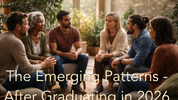In a global year long survey of 42,257 millennials, in 100 countries, the results are clear. We are neither meeting the needs of students or employers. It's the how and what we are teaching them that's out of sync - as they can "find more relevant and practical information online than at university".
Inspiring Critical Thinking and Problem Solving
Facilitating experiential learning, trying and self discovery to find their own answers is the key, to inspiring millennials' learning, rather than seeking to impose knowledge. Self discovery, aides retention and develops sense of accomplishment.
As children we were told, if you touch the oven it will burn you. But it was not until we'd experienced it, we really comprehended the knowledge.
Who's Influencing Careers?
The AIESEC report shows a change in trust in who most influences millennials in making career decisions, "with university advisers ranking last in the list of influencers support in career decisions" with friends being the largest majority. Demonstrating the respect is within the peer group communities, rather than historical hierarchy.
Future Employees or Entrepreneurs?
In my day, most people had jobs, we were employees. But then came the Internet, the freedom of knowledge, 'Massive Open Online Courses' (Mooc's) most of which are free, social learning, the exponential growth of technology and 'Internet of Things' (Lot). Resulting in faster and faster churn of the business cycle.
We have a mismatch of education systems to students - the education system is seeking to produce employees and the students are aspiring to be taught how to be entrepreneurs - this is particularly ironic as most of the jobs today won't exist in 10 years time, if history is a guide.
In the future the key to success will be economies of speed, rather than economies of scale. So entrepreneurship, collaboration, reciprocity and communities are likely to be key characteristics for millennials.
Why? Because millennials have generally a hunger to discover their sense of purpose, the desire to create the future they want, and champion equality. As unlike the generations that have gone before, the millennials are awaking to the real possibility of that they can actually materialise their vision for their future, in contrast to previous generations who just accepted the norm, and the associated blinkered possibilities.
How is this Liberation Possible?
Gone are the shackles of convention. For businesses to grow you needed typically funding from Banking Institutions, who required a plethora of market analysis, financial projections and covenants. Then came Crowdfunding, where startups secure community funding based on little more than a 'good idea' and trust.
Future Education Reform?
How our educational systems will change, time will tell. But looking at the preferred learning styles of millennials, that of the desire to self discover, experiential learning and growth in popularity of social learning, I suspect we will see growth in more facilitated learning, where teachers share knowledge and give instructions, and students then reflect, discuss and discover in share their learning in social learning groups. This has the greater potential for student's to discover new insights and attain greater levels of comprehension. The closest millennial compatible education system we have, and as preferred by Google and Microsoft executives, is the Steiner Waldorf education approach.
As just learning what others already know, is not evolution. This won't help us or the millennials, solve the problems we are leaving as a legacy for our children to sort.
One thing for sure the AIESEC report is a great indicator and discussion topic to stimulate and shape future education policy, and explains the dramatic growth in Home Schooling in the UK. See links below.
Further Reading:
53% of millennials of see a disconnection between what they are learning today versus what they will need tomorrow in AIESEC's Global YouthSpeak report on millennials. Surveying 42,257 respondents from 100 countries, it is one of the largest millennial surveys focused specifically on the journey from education to employment.

